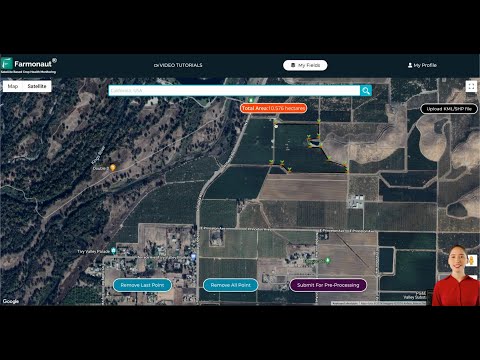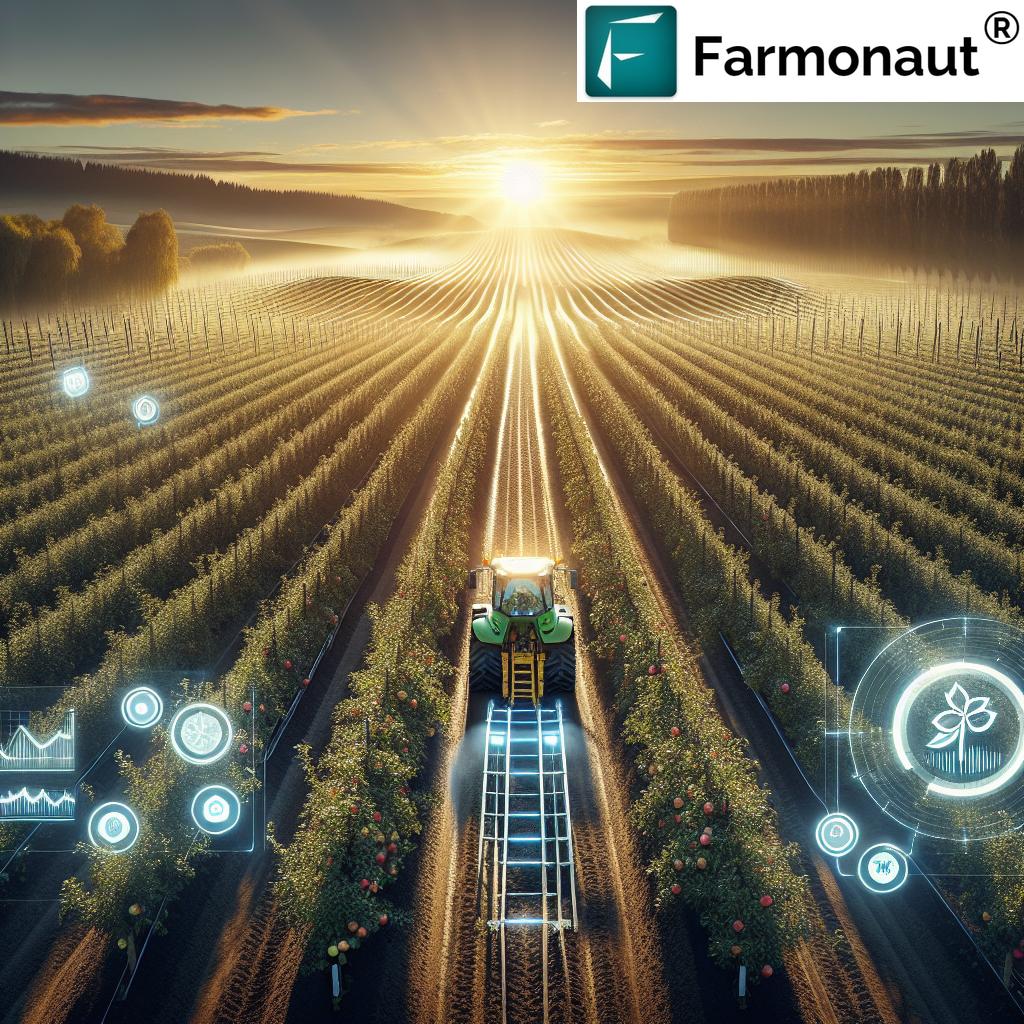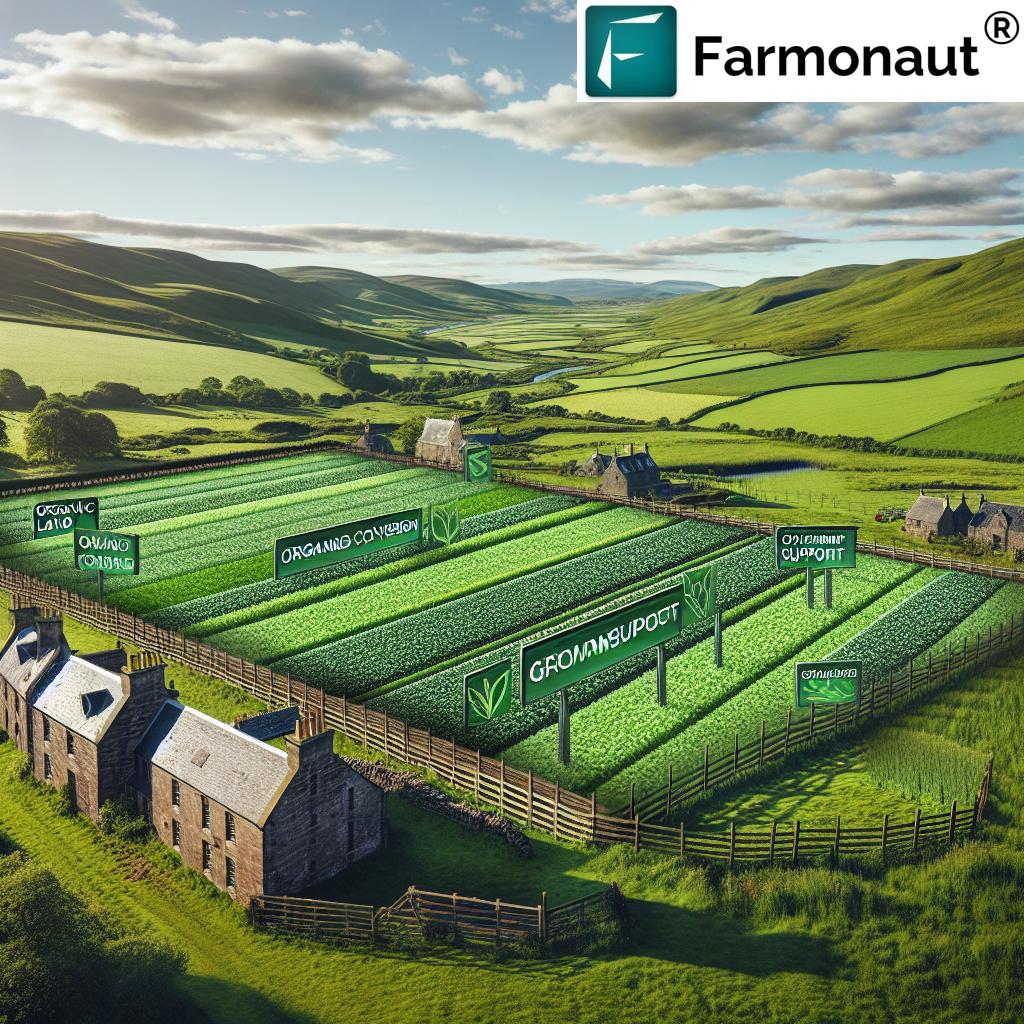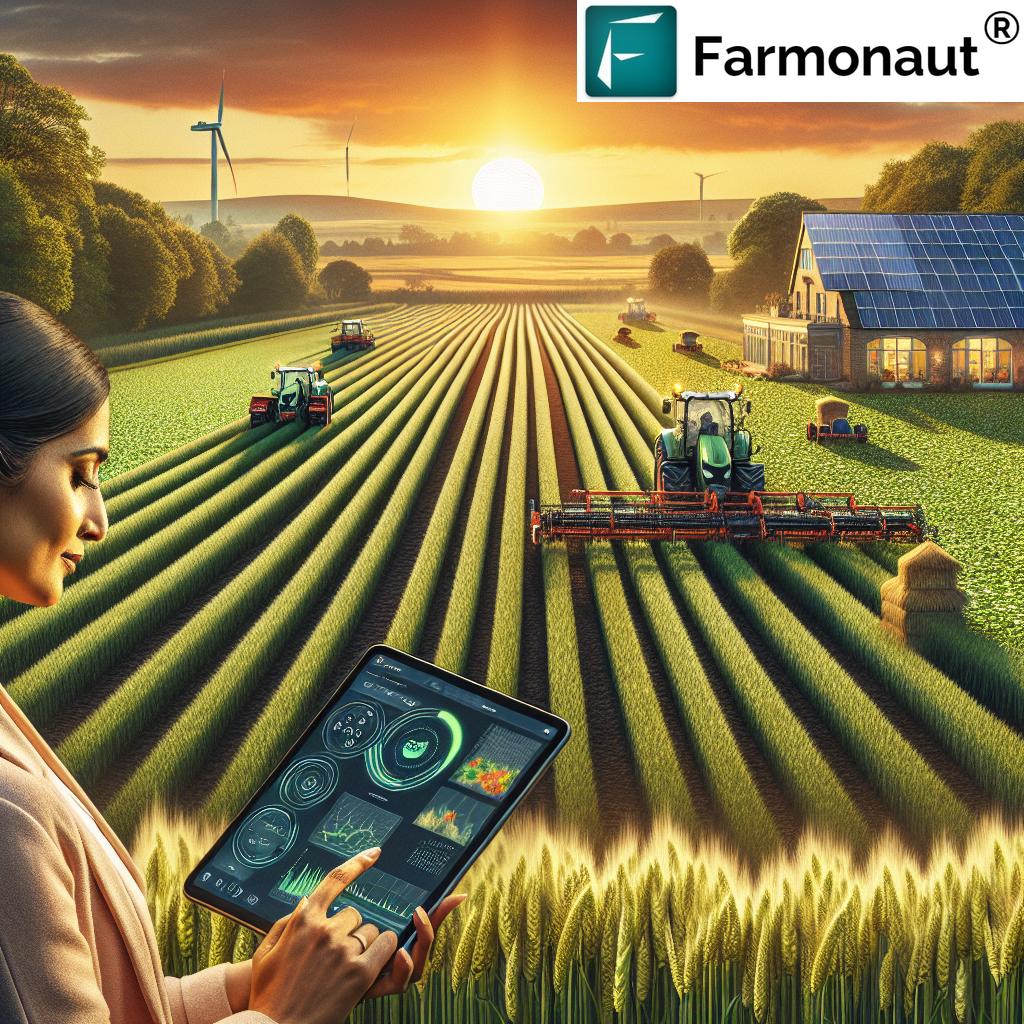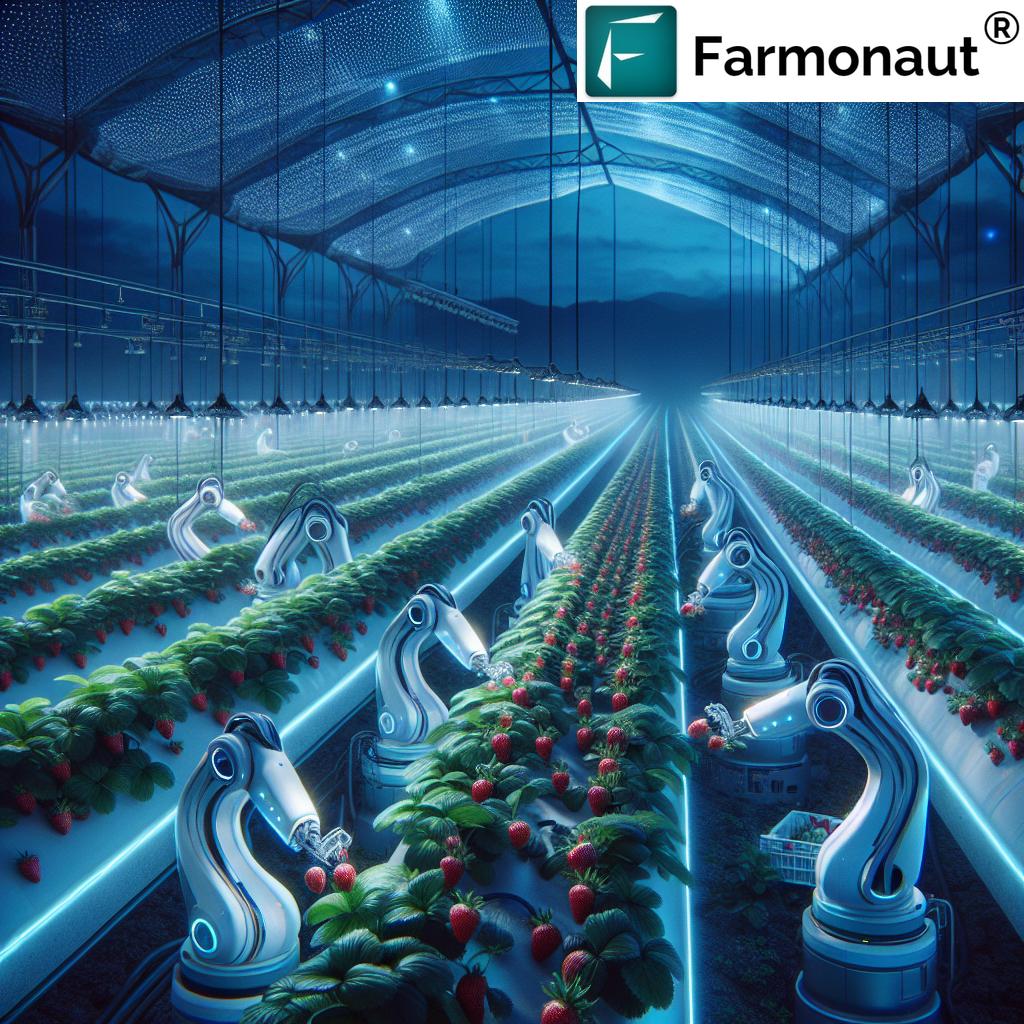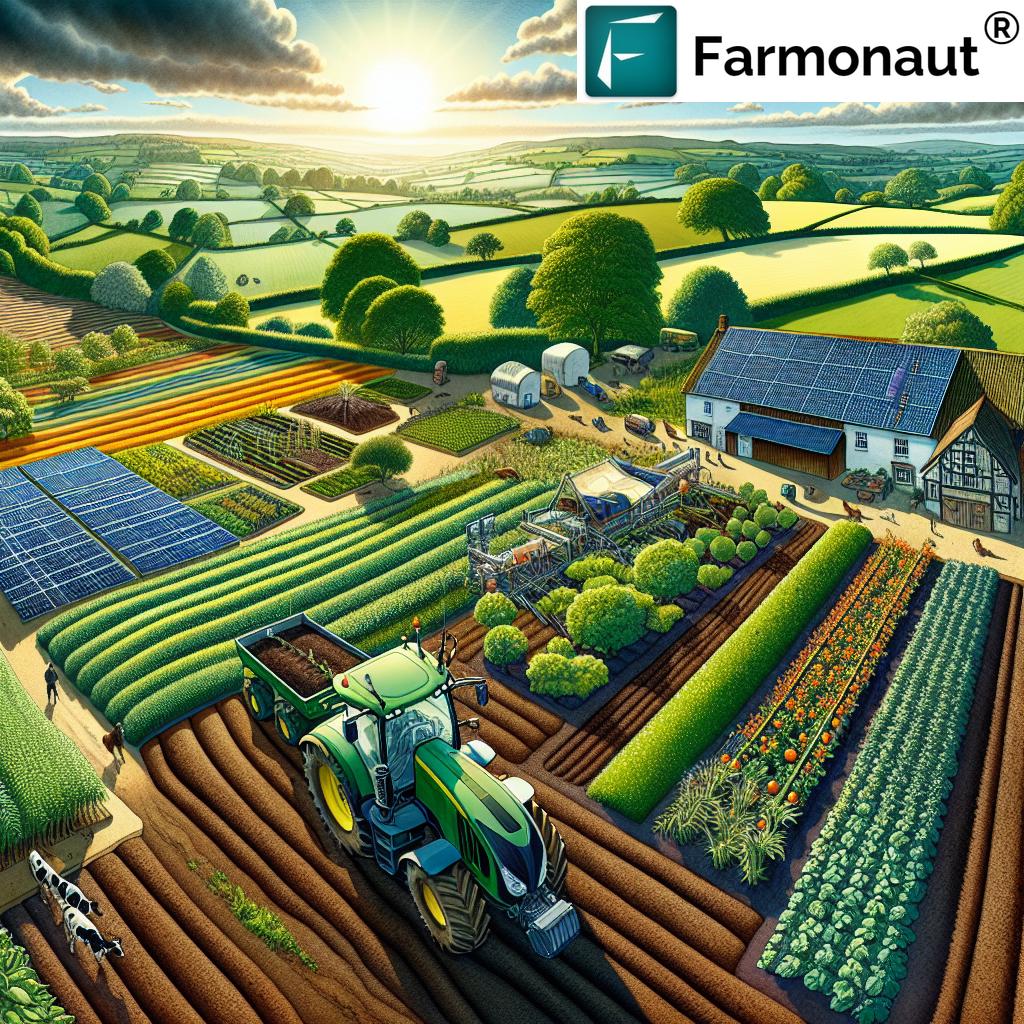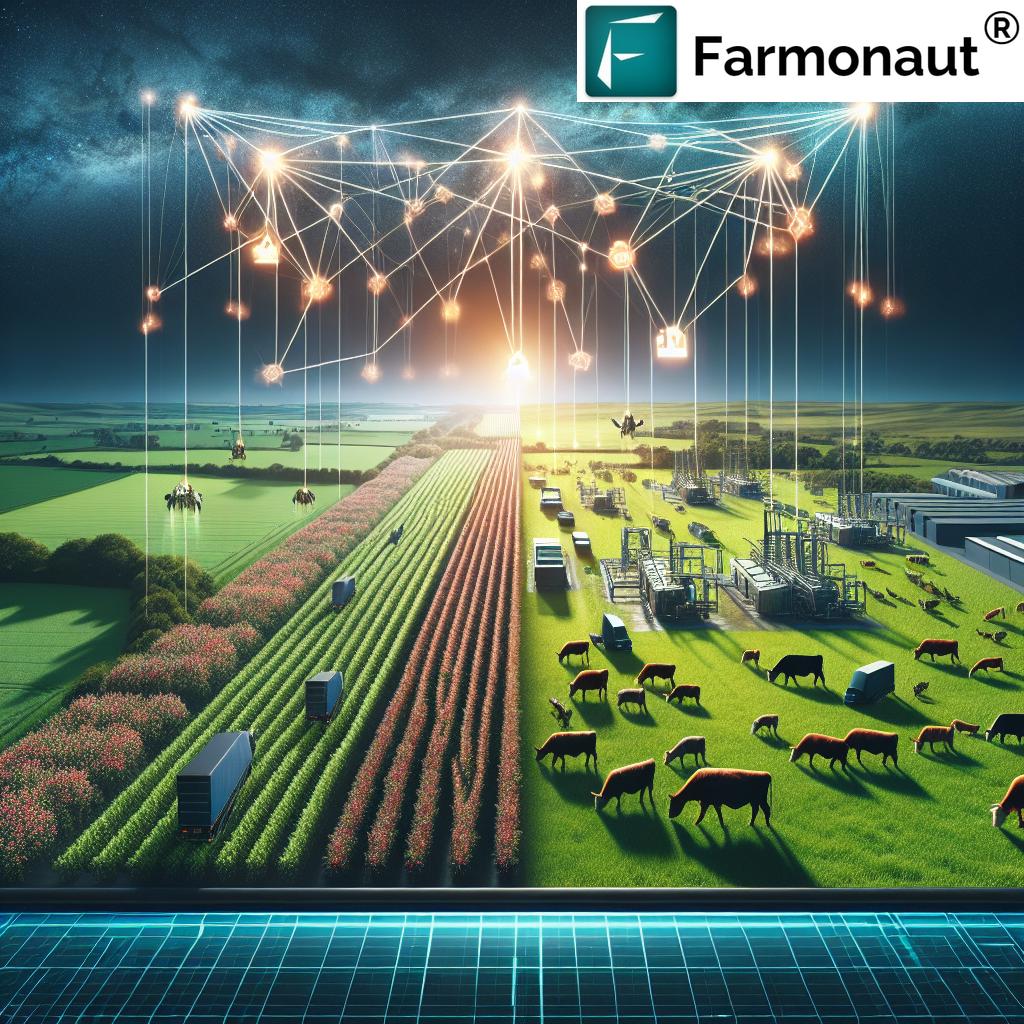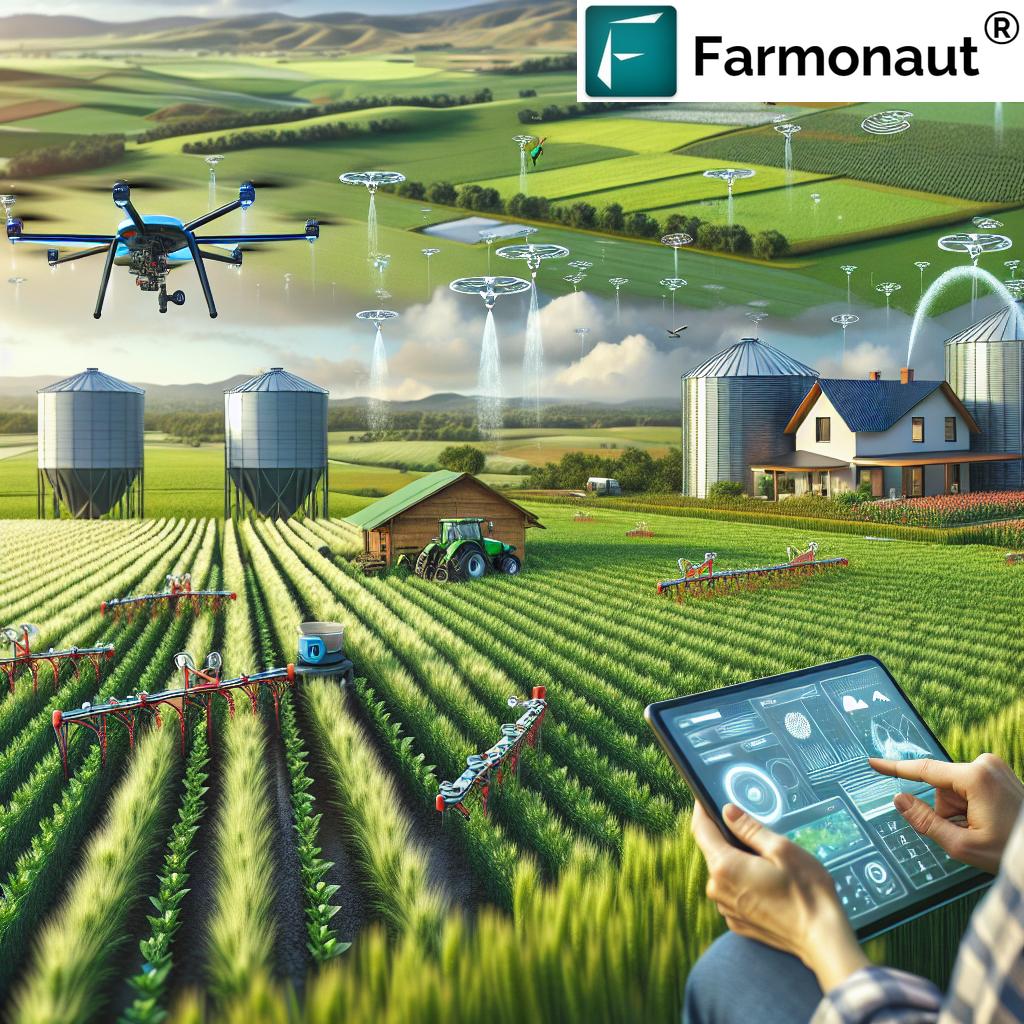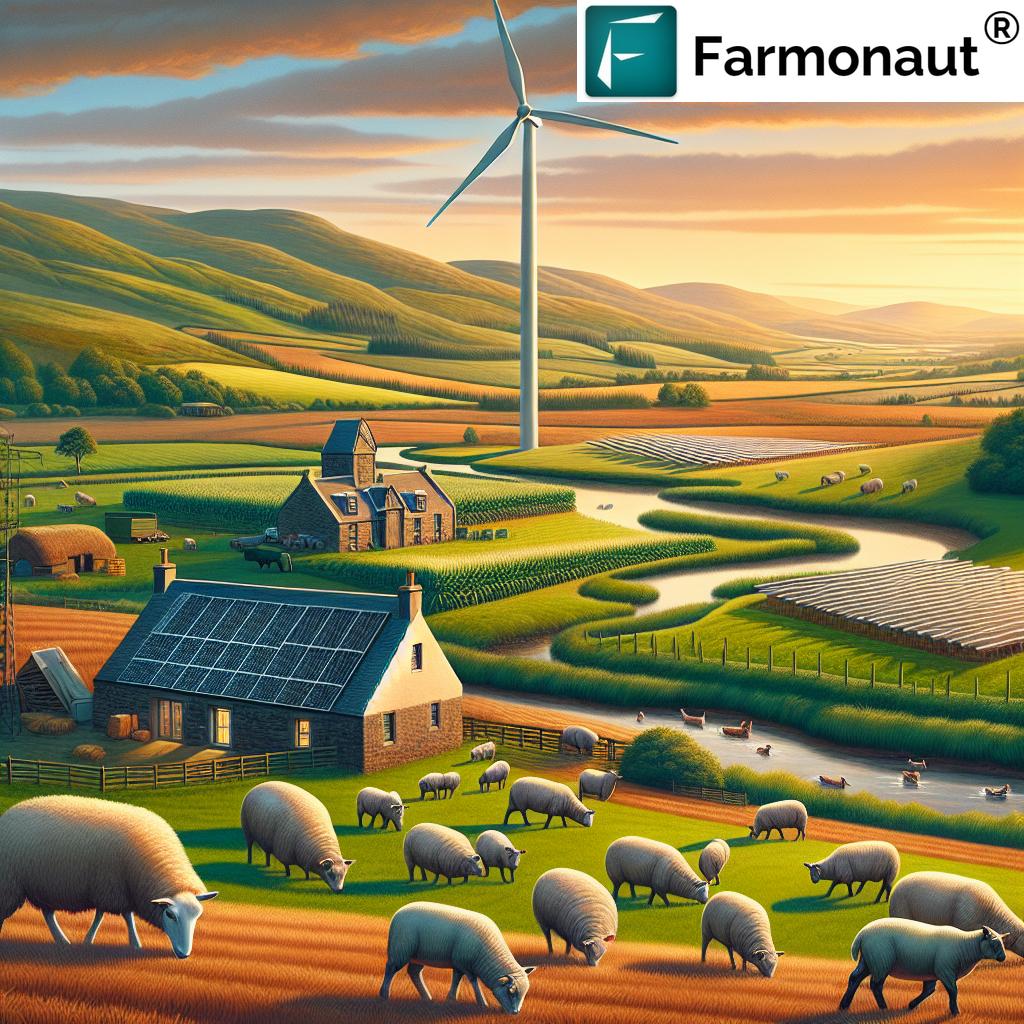Farmonaut: Empowering UK Farmers with Sustainable Agriculture Solutions for Climate Resilience and Net Zero Farming
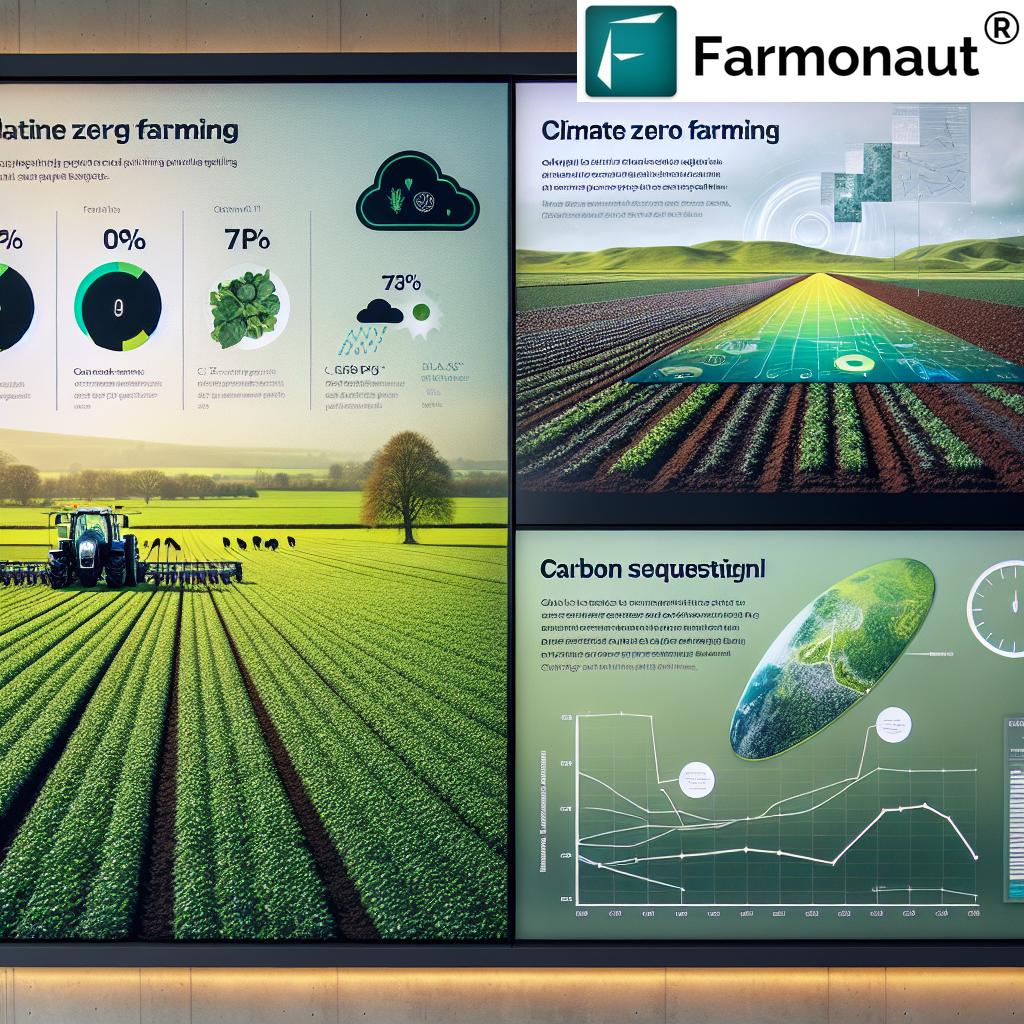
“UK agriculture aims to become a greenhouse gas sink, potentially offsetting more carbon than it emits.”
In the face of unprecedented climate change, the UK agricultural sector stands at a crucial crossroads. As we navigate the complexities of sustainable agriculture practices and climate-friendly farming, it’s clear that our approach to farm management must evolve. At Farmonaut, we’re committed to empowering UK farmers with cutting-edge agricultural technology and innovative solutions that pave the way for climate resilience and net zero farming.
The challenges posed by changing weather patterns and shifting government policies are significant, but so too are the opportunities for growth and adaptation. In this comprehensive exploration, we’ll delve into the intricacies of balancing productivity with environmental stewardship, the critical role of robust management information systems, and the potential for British agriculture to transform into a greenhouse gas sink.
The Climate Change Imperative in UK Agriculture
Climate change is no longer a distant threat but a present reality reshaping the agricultural landscape of the United Kingdom. The impact of climate change on farming is multifaceted, affecting everything from crop yields to livestock management. As weather patterns become increasingly erratic, farmers face new challenges in planning and executing their agricultural strategies.
- Increased frequency of extreme weather events
- Changes in growing seasons and crop suitability
- Altered pest and disease patterns
- Water scarcity and flooding risks
These climate-induced challenges necessitate a paradigm shift in how we approach farming. The adoption of sustainable agriculture practices is no longer optional but essential for the long-term viability of UK farms.
Net Zero Farming: A Vision for the Future
The concept of net zero farming has gained significant traction as a strategic response to climate change. But what does it mean for UK farmers, and how can it be achieved?
Net zero farming refers to the practice of balancing the greenhouse gases emitted by agricultural activities with an equivalent amount removed from the atmosphere. This ambitious goal requires a multifaceted approach, combining innovative farming techniques with cutting-edge technology.
Key strategies for achieving net zero farming include:
- Implementing precision agriculture techniques
- Enhancing soil carbon sequestration
- Adopting renewable energy sources on farms
- Improving livestock management to reduce methane emissions
- Utilizing agroforestry and hedgerow restoration
At Farmonaut, we’re at the forefront of this agricultural revolution, providing farmers with the tools and insights needed to transition towards net zero farming. Our satellite-based crop health monitoring system and AI-driven advisory services empower farmers to make data-driven decisions that not only boost productivity but also minimize environmental impact.
Agricultural Technology: The Cornerstone of Climate Resilience
In the quest for climate resilience, agricultural technology plays a pivotal role. Innovative solutions are emerging that allow farmers to adapt to changing conditions while maintaining or even improving productivity.
Farmonaut’s suite of technologies exemplifies how agritech can drive sustainable agriculture:
- Satellite-Based Crop Health Monitoring: Our advanced imaging technology provides real-time insights into crop health, allowing for precise management of resources.
- AI-Powered Advisory Systems: The Jeevn AI system offers personalized recommendations based on farm-specific data, weather forecasts, and expert knowledge.
- Blockchain-Based Traceability: Ensuring transparency in the food supply chain, from farm to consumer.
- Carbon Footprint Tracking: Helping farmers monitor and reduce their environmental impact.
These technologies not only enhance farm productivity but also contribute significantly to climate change mitigation efforts. By leveraging data and artificial intelligence, farmers can make informed decisions that optimize resource use and reduce waste.
Explore Farmonaut’s API for advanced agricultural data integration
UK Farm Policy and Climate Change: Navigating the Regulatory Landscape
The UK government’s approach to climate change and agriculture is evolving rapidly. Recent policy shifts reflect a growing recognition of the sector’s role in both contributing to and mitigating climate change.
“Government investment is crucial for UK farmers, with climate change adaptation requiring significant financial support for sustainable practices.”
Key policy initiatives include:
- The Environmental Land Management scheme (ELMs)
- Net Zero Strategy for agriculture
- Sustainable Farming Incentive
- Clean Air Strategy targeting ammonia emissions from farming
These policies aim to incentivize sustainable farming practices while supporting farmers through the transition. However, the implementation of these policies presents both challenges and opportunities for UK farmers.
Carbon Sequestration: Turning Farms into Carbon Sinks
One of the most promising avenues for achieving net zero farming is through enhanced carbon sequestration. By implementing specific farming practices, UK farmers can turn their land into effective carbon sinks, pulling CO2 from the atmosphere and storing it in the soil.
Effective carbon sequestration techniques include:
- No-till or reduced tillage farming
- Cover cropping and crop rotation
- Agroforestry and hedgerow management
- Improved grazing management
- Application of biochar
Farmonaut’s technology supports these efforts by providing detailed soil analysis and monitoring capabilities. Our satellite imagery and AI algorithms can track changes in soil organic matter, helping farmers optimize their carbon sequestration strategies.
Check out our API Developer Docs for integrating carbon sequestration tracking
Farm Management Information Systems: The Digital Revolution in Agriculture
In the era of climate-smart agriculture, robust farm management information systems (FMIS) are indispensable. These digital tools enable farmers to collect, process, and analyze data from various sources, leading to more informed decision-making and improved farm performance.
Farmonaut’s FMIS offers:
- Real-time crop monitoring
- Weather forecasting and alerts
- Resource management tools
- Yield prediction models
- Integration with IoT devices and sensors
By leveraging these digital tools, farmers can optimize their operations, reduce waste, and enhance their climate resilience. The ability to make data-driven decisions is crucial in adapting to the unpredictable nature of climate change.
Adapting to Changing Weather Patterns: Strategies for Resilience
The unpredictability of weather patterns due to climate change poses a significant challenge to UK farmers. Adapting to these changes requires a combination of traditional wisdom and modern technology.
Key adaptation strategies include:
- Diversifying crop varieties and livestock breeds
- Implementing water conservation techniques
- Adjusting planting and harvesting schedules
- Investing in climate-controlled agriculture facilities
- Utilizing weather forecasting and early warning systems
Farmonaut’s weather forecasting capabilities, integrated with our crop monitoring system, provide farmers with actionable insights to navigate these challenges. Our AI-driven recommendations help farmers make proactive decisions in response to changing weather conditions.
Government Investment in Sustainable Farming: Bridging the Gap
The transition to sustainable and climate-resilient farming practices often requires significant upfront investment. Recognizing this, the UK government has implemented various schemes and funding opportunities to support farmers in this transition.
Key government initiatives include:
- Farming Investment Fund
- Countryside Stewardship scheme
- Farming in Protected Landscapes programme
- Research and innovation funding for agritech development
While these initiatives provide crucial support, it’s important for farmers to stay informed about available opportunities and how to access them. Farmonaut’s platform includes features to help farmers track and apply for relevant government schemes, ensuring they can leverage available support for their sustainability efforts.
Food Security in a Changing Climate: Balancing Productivity and Sustainability
As the UK faces the dual challenges of climate change and food security, striking a balance between productivity and sustainability becomes crucial. The agricultural sector must find ways to increase food production while simultaneously reducing its environmental footprint.
Strategies for enhancing food security include:
- Promoting local and regional food systems
- Investing in vertical farming and urban agriculture
- Reducing food waste throughout the supply chain
- Encouraging sustainable consumption patterns
- Developing climate-resilient crop varieties
Farmonaut’s technology supports these efforts by optimizing farm productivity, reducing resource waste, and providing traceability throughout the food supply chain. Our blockchain-based solutions ensure transparency and build consumer trust in the sustainability of food products.
The Future of UK Agriculture: Navigating Climate Change Impacts
As we look to the future, it’s clear that the UK agricultural sector will continue to face significant challenges due to climate change. However, with the right strategies and technologies, these challenges can be transformed into opportunities for innovation and growth.
Key areas of focus for the future include:
- Continued investment in agritech research and development
- Enhancing collaboration between farmers, researchers, and policymakers
- Developing climate-resilient infrastructure for agriculture
- Promoting knowledge sharing and best practices among farmers
- Integrating agriculture into broader climate change mitigation strategies
At Farmonaut, we’re committed to being at the forefront of these developments, continuously evolving our platform to meet the changing needs of UK farmers in the face of climate change.
Comparative Analysis: UK Climate-Resilient Farming Strategies
| Farming Strategy | Climate Resilience Score (1-10) | Carbon Sequestration Potential (tonnes CO2e/hectare/year) | Implementation Cost (£/hectare) | Government Support Available | Productivity Impact (%) | Technology Requirements |
|---|---|---|---|---|---|---|
| Precision Agriculture | 9 | 1.5 – 3.0 | 500 – 2000 | Yes | +10 to +30 | High (GPS, sensors, data analytics) |
| Agroforestry | 8 | 2.0 – 5.0 | 1000 – 3000 | Yes | -5 to +15 | Medium (tree management systems) |
| Conservation Tillage | 7 | 0.5 – 1.5 | 100 – 500 | Yes | 0 to +10 | Low (specialized equipment) |
| Cover Cropping | 8 | 0.3 – 1.0 | 50 – 200 | Yes | +5 to +15 | Low (seed selection tools) |
| Integrated Pest Management | 7 | 0.1 – 0.5 | 200 – 1000 | Yes | +5 to +20 | Medium (pest monitoring systems) |
| Crop Rotation | 8 | 0.2 – 0.8 | 50 – 300 | Yes | +10 to +25 | Low (planning software) |
| Organic Farming | 7 | 1.0 – 2.0 | 1000 – 5000 | Yes | -10 to +5 | Medium (soil health monitoring) |
This comparative analysis highlights the diverse range of climate-resilient farming strategies available to UK farmers. Each approach offers unique benefits and challenges, underlining the importance of tailored solutions for individual farm contexts. Farmonaut’s technology can assist in implementing and optimizing many of these strategies, particularly in areas requiring high-tech solutions like precision agriculture and integrated pest management.
Conclusion: Embracing a Sustainable Future for UK Agriculture
As we navigate the complexities of climate change and its impact on UK agriculture, it’s clear that the path forward lies in embracing sustainable practices, leveraging cutting-edge technology, and fostering a spirit of innovation and adaptation. The journey towards net zero farming and enhanced climate resilience is not without its challenges, but it also presents unprecedented opportunities for growth, efficiency, and environmental stewardship.
At Farmonaut, we’re committed to supporting UK farmers every step of the way on this journey. Our comprehensive suite of agricultural technology solutions, from satellite-based crop monitoring to AI-driven advisory systems, is designed to empower farmers with the tools and insights they need to thrive in an ever-changing climate landscape.
By combining the wisdom of traditional farming practices with the power of modern agritech, we can build a resilient, sustainable, and productive agricultural sector that not only adapts to climate change but actively contributes to its mitigation. Together, we can transform the challenges of today into the opportunities of tomorrow, ensuring a bright and sustainable future for UK agriculture.
FAQ Section
- Q: What is net zero farming and why is it important?
A: Net zero farming refers to agricultural practices that aim to balance greenhouse gas emissions with an equivalent amount of carbon removal. It’s crucial for mitigating climate change and ensuring long-term sustainability of the agricultural sector. - Q: How can Farmonaut’s technology help in achieving climate resilience?
A: Farmonaut offers satellite-based crop monitoring, AI-driven advisory systems, and carbon footprint tracking tools that help farmers make data-driven decisions, optimize resource use, and implement sustainable practices. - Q: What government support is available for UK farmers transitioning to sustainable practices?
A: The UK government offers various schemes such as the Environmental Land Management scheme (ELMs), Sustainable Farming Incentive, and the Farming Investment Fund to support farmers in adopting sustainable practices. - Q: How does climate change impact UK agriculture?
A: Climate change affects UK agriculture through increased frequency of extreme weather events, changes in growing seasons, altered pest and disease patterns, and water scarcity or flooding risks. - Q: What are some effective carbon sequestration techniques for farms?
A: Effective carbon sequestration techniques include no-till farming, cover cropping, agroforestry, improved grazing management, and application of biochar.


